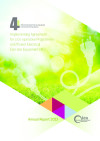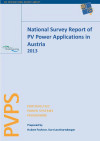Suchergebnisse für "Factsheet: Energietechnologien gestalten, die für alle sinnvoll und nutzbar sind"
IEA Industrial Energy-Related Technologies and Systems (IETS TCP)
The Industrial Energy-Related Technology Programme (IETS) focuses on energy use in a broad range of industry sectors. It fosters international co-operation amongst relevant research strands, networking within and across industrial sectors, as well as exchange of information and knowledge between experts from industry, science and politics.
IEA IETS Task 17: Membrane processes in biorefineries (Working period 2024 - 2025)
Membrane technologies in biorefineries are essential for industrial development in order to enable the transition to a bio-based industry. Biomass as a raw material requires efficient processes. The IEA IETS Task XVII (24-26) project promotes the transfer of know-how between research, industry and membrane manufacturers for resource-efficient applications. The national task strengthens the Austrian research landscape through networking activities.
Development and optimization of a parabolic trough solar collector for generation of process heat for industrial processes
Development and optimization of a parabolic trough solar collector for generation of process heat for industrial processes. The operating performance and optimization possibilities of a prototype were evaluated and an improved prototype was tested with respect to its efficiency characteristics as well as in a small-scale application with a realistic load profile.
Raise in efficiency due to optimized waste heat management in heat intensive processes of the metal-working industry
This project drives at optimizing the energy input at the manufacturing process of oil tempered spring steel. This aim is met by investigating different options of waste heat recovery from industrial furnaces and heat insulation of heat treatment bathes. Besides, options of lead removal from anthracite will be listed.
IEA IETS Task 17: Membrane processes in biorefineries (Working period 2023 - 2025)
Biorefineries are essential for the transition from petroleum- to a biobased industry. The use of biomass as raw material for recyclable materials, chemicals and energy sources is essential and requires efficient and sustainable production processes. This project aims to strengthen national and international know-how transfer between research and development for membrane-based processes in biorefineries. The focus is on application, improvement and innovation in all aspects of membrane distillation.
IEA-4E Jahresbericht 2013

Der Jahresbericht umfasst die wichtigsten Errungenschaften des Jahres 2013, sowie eine Zusammenfassung der Aktivitäten der einzelnen 4E Annexes.
Herausgeber: IEA 4E
Englisch, 46 Seiten
Downloads zur Publikation
Personal Power Plant
The application of PEM fuel cells is limited to certain singular products. The reason for this are the relatively high prices for the components of a PEM fuel cell. It is the aim of this project to fabricate the components of a PEM fuel cell by using mass production technologies such as injection moulding. In sequence this will lead to wide-spread applications of PEM fuel cells (personal-power-plant).
Development of miniaturized, ceramic high-temperature fuel-cell-components using resources-perserving mass-production processes
The application of nano scaled powder and powder injection moulding (PIM) for energy efficient co-sintering of miniaturized solid oxid fuel cells which can produce current and heat by using renewable raw materials.
IEA-IETS Annex 15: Industrial Excess Heat Recover (Phase 2)
In the framework of IEA IETS Annex 15 potentials of excess heat and technologies for their integration were collected from national research projects, bundled and elaborated on. This way, a broad knowledge base was built on experience gained in carrying out surveys for potential use of excess heat. Experiences with questionnaires, process integration tools and extrapolation of data using existing knowledge about the respective energy systems were exchanged. A process database with detailed process information could also be established, which can be used for further research activities. Also, in the area of policy instruments, recommendations for future measures to increase the use of surplus heat were derived on the basis of national contributions.
Increasing of the resources-efficiency by experimental optimisation of steam production and by reduction of production residues in a metal-processing factory
The project is based on the results of the currently running project "Use of waste heat and renewable energy sources in a metal-processing factory". In this project it was found, that nearly the half of the consumption of natural gas is needed for steam production. Based on calculations already carried out, it is planned to investigate experimentally the possibilities of increasing the resource-efficiency by lowering the steam temperature and by replacing steam by hot water. Further increasing of resource-efficiency shall be achieved by use of internal residues as an additional fuel in a solid fuel furnace.
National Survey Report of PV Power Applications in Austria 2013

Der Survey report Österreich 2013 gibt einen Überblick über Photovoltaik-Technologieentwicklungen, den österreichischen Markt sowie die nationalen politischen Rahmenbedingungen.
Herausgeber: IEA PVPS Task 1, Technikum Wien
Englisch, 31 Seiten
Downloads zur Publikation
Transfer of results of the program "Factory of Tomorrow" into the target groups of energy managers and energy consultants
Transfer of results of the program "Factory of Tomorrow" with respect to energy efficiency and increased adoption of renewable energy technologies into the target groups of internal energy managers and external energy consultants. The transfer activities include carrying out a one-day-seminar twice and the preparation of freely available training materials.
New solvents and processes for post-combustion CO2 capture
New and better solvents for CO2 absorption can reduce the costs of Carbon Capture and Storage significantly. Therefore, the ability to absorb CO2 and the vapour - liquid equilibrium curve of different new solvents will be determined in the laboratory and under real operating conditions at a power plant. Furthermore, the achievable CO2 removal efficiency of spray towers will also be investigated for different solvents.
Sustainable energy supply: Production and import of biomass and bio fuels
The project gives an overview of the supply and demand for biofuels specifically dealing with the situation in Europe and that in threshold and developing countries using case studies as examples. Cases: Sweden and France as importing countries in the EU, and Senegal as a (potential) exporting nation.
IEA IETS Annex 18: Digitalization, artificial intelligence and related technologies for energy efficiency and reduction of GHG emissions in industry (Working period 2020 - 2023)
The work in Task 18 enables the exchange of experience and knowledge between industry and research institutions from different countries. Through this cooperation best practices are identified and disseminated to promote the implementation of energy-efficient technologies in industry. In the medium and long-term, this contributes to reduce energy consumption and greenhouse gas emissions of industry.
Multifunctional Energy Centre Kötschach-Mauthen - model-system to achieve energy-self-sufficiency
Development of concepts for a multifunctional Energy Centre (biomass district heating und biogas polygeneration for the supply of heat, electricity, process heat, cooling and biofuels) and for a "Öko-Energietourismus" for the community of Kötschach-Mauthen on the way to energy-self-sufficiency
IEA IETS Task 18: Digitalization, Artificial Intelligence and Related Technologies for Energy Efficiency and GHG Emissions Reduction in Industry (Working period 2023 - 2024)
The work in Task 18 enables the exchange of experience and knowledge between industry and research institutions from different countries. Through this cooperation best practices are identified and disseminated to promote the implementation of energy-efficient technologies in industry. In the medium and long-term, this contributes to reduce energy consumption and greenhouse gas emissions of industry.
RaumCoop 2.0 - Space Cooperative, a systematic operational model for activating unused or underutilized spaces.
The RaumCoop organizes the sharing of spaces, mobilizes underutilized spaces for non-residential purposes in the ground floor area, and makes them available for temporary use at affordable conditions. The goal of the project is to establish this non-profit organization.
Development of a solid-wood-passivehouse-window
Based on experience with low-energy-windows, a solid wood window is being developed, which meets passivehouse-standards.
MADOKLI - Mannersdorf climate fit! Using local resources to combat and adapt to climate change for a climate-neutral neighbourhood
Development of a climate-neutral neighbourhood by integrating previously unused heat sources and sinks, such as the underground Mühlbach stream, to supply municipal buildings, to establish use-oriented water management and to develop solutions for climate-friendly outdoor spaces in the centre of Mannersdorf am Leithagebirge.
